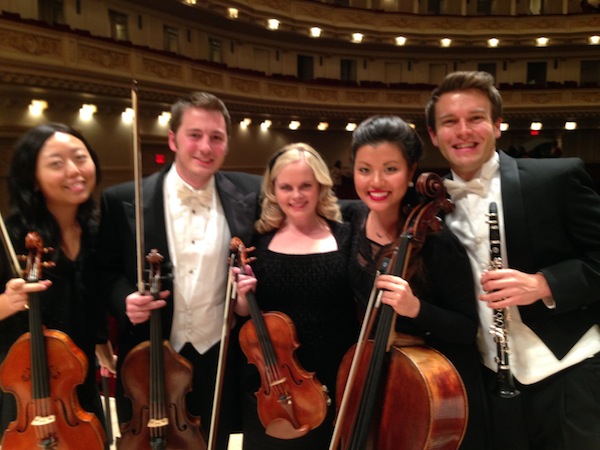
NWS travels to NYC for benefit concert
By Hilary Saunders, New World Symphony
One week before the members of United Nations convened in Switzerland for the Geneva II conference about the Syrian Civil War, hundreds of New Yorkers began to amass in Carnegie Hall. They, along with musicians representing some 70 orchestras, ensembles, and freelancers, came to the famed institution on a mission—not just to perform an emotive rendition of Shostakovich’s Seventh Symphony, but to raise funds and awareness for the refugee children affected by Syria’s current civil unrest.
Organized by Music for Life Inc., which takes its name from Leonard Bernstein’s legendary Music for Life concerts that took place at the same venue in the late 1980s, Shostakovich for the Children of Syria served as a meaningful opportunity to present classical music within a framework of international humanitarian issues. Net proceeds from the event benefited Doctors Without Borders —a French non-governmental organization that provides humanitarian heath aid to developing and war-torn countries—that has worked in Syria since 2009.
Five New World Symphony Fellows and two alumni traveled to New York City to participate in the event. Violin Fellow Colleen McCullough, Viola Fellows Anthony Parce and Eve Tang, Cello Fellow Grace An, and Clarinet Fellow Brad Whitfield, along with alumni Elzbiata Weyman (viola, New Jersey Symphony) and Eli Maurer (trumpet) joined members of the Metropolitan Opera Orchestra, New York Philharmonic, The Philadelphia Orchestra, Orpheus Chamber Orchestra and others to create an ensemble of 125 musicians.
From L-R, Viola Fellow Eve Tang, Viola Fellow Anthony Parce, Violin Fellow Colleen McCullough, Cello Fellow Grace An and Clarinet Fellow Brad Whitfield. Photo by Grace An
“When I went up to New York, I thought of myself as a musician going to perform a concert that would benefit a humanitarian cause,” writes An, a second-year Fellow.
“I separated what I was going to do, which was play the cello in a Shostakovich symphony, with the intent, which was a humanitarian effort to aid innocent children living in unimaginable circumstances. In my mind, I was going to do what I knew how to do—be a musician—so that others somewhere far away could do what they knew how to do—be humanitarians. I had not thought about the possibility that these two roles could be intimately connected.”
Singapore-born Indian conductor George Mathew led the evening that featured just two works: Syrian clarinetist and composer Kinan Azmeh’s Sabah Hazeen, Kul Sabah (A Sad Morning, Every Morning) for solo clarinet and Shostakovich’s “Leningrad” symphony.
In speaking about the benefit, Mathew described the work and its modern day parallels: “Dmitri Shostakovich’s searing Seventh Symphony, “Leningrad,” was written during its own composer’s experience as an internal refugee while surviving the twin ordeals of Stalin’s oppression and the urban catastrophe, which was the Nazi army’s 900-day siege of Leningrad. There are uncanny resonances between the context of Shostakovich’s monumental symphony and the Syrian Civil War, now past the tragically kindred milestone of 1000 days. The Leningrad Symphony bears witness to the complex vortex of oppression and war, bombs from earth and sky, the explosions, the deathly silence afterwards, the waves of numbing grief and loss, and ultimately the resilience of human beings in the face of violence and death.”
The performance garnered international coverage everywhere from The New York Times and The Buffalo News to the BBC. Back at home, though, NWS Fellows reflect on the performance and the role of classical music in today’s society. An concludes, “On the way back home to Miami, I felt so grateful to have participated in this experience, which contributed to my growth not just as a young musician but also as a citizen of humanity.”
Recent Content
-
Artsarticle ·
-
Artsarticle ·
-
Artsarticle ·
